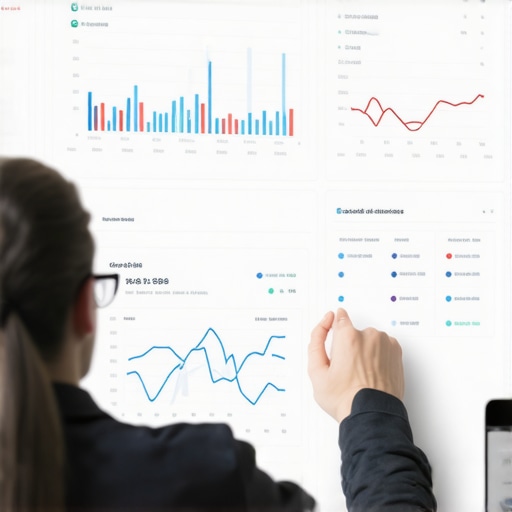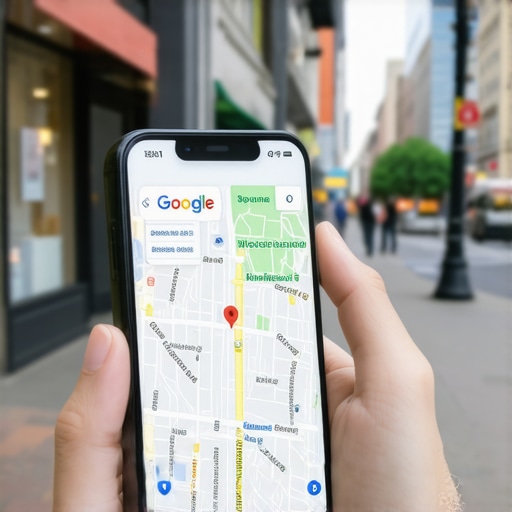Discovering the Power of Google Maps for My Business Growth
When I first started my local business, I quickly realized that having a strong online presence was essential. I remember spending hours optimizing my Google My Business (GMB) profile, eager to see it rank higher on Google Maps. My journey was filled with learning, experimenting, and a few setbacks, but eventually, I found some effective strategies that truly made a difference.
Why Optimizing My GMB Profile Became My Top Priority
From my experience, a well-optimized GMB profile can significantly boost local visibility. I focused on ensuring my business information was accurate, complete, and keyword-rich. I also learned that engaging with customer reviews and posting regular updates could improve my rankings. For this, I often referred to these optimization tips to stay on top of best practices.
The Role of Local SEO Support in My Success
Despite all my efforts, I knew I needed expert advice to get ahead of competitors. I reached out for advanced GMB support techniques that could help me outrank local rivals. Working with SEO professionals provided me with insights into backlink strategies, citation management, and algorithm updates, which are crucial for maintaining high rankings.
What Are the Key Factors That Influence Google Maps Rankings?
Curious about how Google determines local rankings?
Google considers several factors, including relevance, distance, and prominence. My experience taught me that optimizing for relevance—like adding detailed descriptions and relevant keywords—was just as important as encouraging positive reviews. According to expert insights, a comprehensive local SEO approach is the key to climbing those rankings.
My Next Steps and Invitation to Share Your Experience
If you’re aiming to improve your Google Maps visibility, I recommend diving into a combination of on-page optimization, review management, and expert SEO support. Every business is unique, so experimenting and tracking your progress is vital. I invite you to share your own experiences in the comments or explore more about transforming your business with SEO strategies. Together, we can elevate our local presence and dominate Google Maps rankings!
Unveiling Advanced Techniques to Dominate Google Maps Rankings
In the ever-evolving landscape of local SEO, staying ahead requires a nuanced understanding of Google’s ranking factors and the strategic application of expert techniques. While basic optimization lays the foundation, advanced strategies can propel your business to the top of Google Maps, ensuring maximum visibility and customer engagement.
The Significance of Niche-Specific Optimization
One of the most overlooked aspects is tailoring your GMB profile to reflect niche-specific keywords and services. For instance, a plumbing company should emphasize terms like “emergency leak repair” or “pipe installation” rather than generic keywords. This targeted approach enhances relevance and attracts highly qualified local searches, as highlighted in these innovative SEO techniques.
Leveraging User-Generated Content for Authority
Encouraging detailed reviews and photos from satisfied customers not only boosts engagement but also signals to Google your authority within your niche. Implementing a review acquisition strategy—such as follow-up emails or review kiosks—can significantly impact rankings. Remember, reviews with relevant keywords can help Google better understand your business offerings, further improving your local SEO performance.
How Can You Use Data-Driven Insights to Refine Your Strategy?
Are you harnessing Google My Business Insights effectively to enhance your local SEO efforts?
Google My Business Insights offers valuable data on how customers find your listing, what actions they take, and where they come from. Analyzing this information enables you to identify high-performing keywords, peak engagement times, and customer preferences. With this knowledge, you can optimize your profile, posts, and service offerings more precisely, aligning your strategy with actual user behavior. For expert guidance, consider exploring effective Google Maps ranking support tips to leverage data analysis for better results.
The Impact of Consistent NAP Citations and Backlink Building
Maintaining consistent Name, Address, Phone Number (NAP) citations across reputable directories signals trustworthiness to Google. Additionally, building high-quality backlinks from local websites and industry authorities strengthens your profile’s authority. Combining these tactics with ongoing review management creates a comprehensive SEO ecosystem that sustains and elevates your rankings over time.
What Are the Emerging Trends That Will Shape Google Maps SEO in 2024?
How can proactive adaptation to new features and algorithm updates secure your top spot?
Google continually introduces new features, such as booking integrations, product showcases, and enhanced review systems. Staying informed about these updates and integrating them into your profile can provide a competitive edge. Regularly monitoring industry news and leveraging expert support—like the insights found at master local SEO support—is essential for maintaining top rankings.
If you’re serious about elevating your local presence, I encourage you to share your experiences or ask questions in the comments below. For further insights, explore our comprehensive guides on boost Google Maps rankings and transform your business with cutting-edge SEO strategies.
Deepening My Understanding of Google’s Nuanced Ranking Factors
As I delved further into Google Maps SEO, I realized that the algorithm’s complexity extends beyond the basic optimization tactics I initially employed. For instance, Google’s use of machine learning to interpret user behavior and contextual relevance has become more sophisticated, making it essential to adapt my strategies accordingly. I spent hours scrutinizing case studies and SEO reports, which revealed that factors like voice search optimization, behavioral signals, and even local social media engagement can sway rankings significantly. This realization pushed me to explore advanced SEO tactics that align with these evolving signals, ensuring I stay ahead in the game.
How Do I Balance Niche-Specific Optimization with Broad Relevance?
One of the more subtle challenges I faced was striking the right balance between niche-specific keywords and broader relevance to attract a wider yet qualified local audience. For instance, while emphasizing specialized terms like “emergency leak repair” helped attract high-intent customers, I also needed to maintain a presence for more general keywords like “plumbing services.” Achieving this balance required meticulous keyword research and consistent content updates that reflect seasonal trends and regional dialects. I found that leveraging innovative SEO techniques such as hyper-local content and geo-specific landing pages can amplify relevance without diluting niche authority, ultimately boosting my rankings across various search intents.
What Role Does Local Community Engagement Play in Google Maps Authority?
Beyond technical optimization, I discovered that genuine community involvement can significantly enhance my business’s authority in Google’s eyes. Participating in local events, sponsoring community initiatives, and encouraging customers to share their experiences on social media creates a network of authentic signals that Google recognizes as trustworthiness and prominence. I personally started hosting workshops and local meetups, which not only generated valuable review content but also fostered relationships that translated into organic backlinks and citations. These efforts proved that community engagement is a powerful yet often overlooked component of local SEO, reinforcing the importance of authentic relationships in the digital landscape.
Is It Possible to Future-Proof Google Maps SEO Against Algorithm Changes?
Staying resilient amidst frequent algorithm updates is a concern I continually grapple with. My approach involves diversifying my local SEO efforts—balancing on-page optimization, review management, backlink building, and active community participation—so that no single tactic becomes a vulnerability. Additionally, I keep myself informed through industry updates and support channels, such as these strategic guides. By adopting a holistic, adaptable approach, I aim to create a sustainable foundation that withstands algorithm shifts and maintains high visibility for my business.
If you’re exploring advanced strategies for Google Maps success, I invite you to share your insights or ask questions below. For deeper dives into proven techniques, check out our resources on mastering local SEO support and transforming your local presence with cutting-edge tactics.
Harnessing Local Data Signals for Superior Google Maps Rankings
In my ongoing quest to refine local SEO tactics, I discovered that leveraging granular data signals from Google My Business Insights can dramatically enhance ranking precision. By meticulously analyzing metrics such as customer search queries, action types, and geographic origins, I tailored my optimization efforts to align with actual user behaviors. This data-driven approach ensures that my profile appeals directly to high-intent local searches, creating a competitive edge in crowded markets. For those seeking to deepen their understanding, exploring these effective support tips can unlock new levels of local visibility.
The Power of Hyper-Local Content and Geo-Targeted Landing Pages
To truly stand out in local SEO, I found that developing hyper-local content tailored to specific neighborhoods or districts within my service area profoundly impacts relevance. Creating geo-targeted landing pages that highlight community-specific keywords not only boosts organic rankings but also fosters trust with local consumers. This approach integrates seamlessly with Google’s emphasis on relevance and prominence, helping my business appear in more nuanced local searches. I often revisit these innovative techniques to stay ahead of evolving search dynamics.
Integrating Voice Search Optimization for Future-Proof Rankings
Recognizing the surge in voice-activated device usage, I dedicated efforts to optimizing my GMB profile for voice search queries. This involved incorporating conversational keywords, FAQ snippets, and natural language phrases that align with how users verbally inquire about local services. Google’s recent updates suggest that voice search will continue to influence local rankings significantly, making this a critical component of advanced SEO strategies. For a comprehensive dive into this topic, I recommend consulting these expert insights.
< >
>
Engaging with Niche Communities for Authentic Authority Building
Beyond technical optimizations, I actively engaged with niche online communities relevant to my industry. Participating in forums, local Facebook groups, and industry-specific online platforms allowed me to share expertise, gather valuable backlinks, and generate authentic reviews. This community involvement signals to Google that my business is a trusted authority within its niche, positively influencing rankings. I’ve found that sustained engagement and providing value in these spaces create a ripple effect of digital credibility that outperforms purely algorithm-driven tactics. To explore this further, visit these advanced support resources.
Staying Resilient Amidst Algorithm Evolution
One of my key learnings has been the importance of adaptability. Google’s algorithms continually evolve, emphasizing different ranking factors over time. To future-proof my local SEO efforts, I diversified strategies—balancing on-page enhancements, citation consistency, review cultivation, and community engagement—so that my rankings remain resilient. Regularly reviewing industry updates and leveraging expert support, such as these strategic guides, helps me stay prepared for upcoming shifts. This holistic approach ensures my business remains visible, regardless of algorithmic changes.
If you’re committed to elevating your Google Maps presence with these advanced techniques, I encourage you to share your experiences or ask questions below. For more tailored advice, explore our comprehensive resources at these support strategies and take your local SEO to the next level.
Things I Wish I Knew Earlier (or You Might Find Surprising)
Relevance Over Quantity
Early on, I believed that flooding my profile with keywords was the key, but I soon realized that quality relevance mattered far more. Tailoring my descriptions to match what local customers actually search for made a noticeable difference in my visibility.
The Power of Customer Photos
Encouraging clients to upload photos transformed my profile’s credibility. Google favors active, engaging profiles, and real customer visuals can boost your rankings organically. It’s like building social proof in real time.
Consistency Is Key, but Quality Matters Too
Keeping NAP (Name, Address, Phone) info consistent across directories is crucial, yet I found that updating my profile regularly with fresh posts and offers kept me top of mind with both Google and potential customers.
Community Engagement Pays Off
Participating in local events and online community groups not only built goodwill but also garnered local backlinks and reviews, which are gold for local SEO. It’s about building relationships, not just optimizing profiles.
Voice Search Is the Future
Optimizing for voice queries meant using more natural language and FAQs. As voice searches increase, this nuanced approach helped me capture a broader audience and stay ahead of the curve.


Reading through this post really resonated with my own experience in local SEO. When I first started focusing on my Google My Business profile, I underestimated the importance of niche-specific keywords and community engagement. I found that actively participating in local forums and encouraging customers to share photos helped build a sense of trust and authority, which Google seems to value highly. One thing I’ve noticed is that leveraging actual user data from Google My Business Insights allowed me to refine my keyword strategy and posting schedule more effectively. I’m curious, how do others balance between optimizing for broad relevance versus hyper-local relevance, especially in competitive markets? Additionally, have you found any innovative ways to encourage more customer reviews that include targeted keywords? These little tactics really seem to add up in boosting local rankings.
This post resonated with my own journey in boosting local visibility. I completely agree that a detailed and keyword-rich GMB profile plays a pivotal role, but I’ve found that consistency and authentic engagement are just as important. For example, encouraging genuine customer photos and reviews really helps to build social proof and trust, which Google clearly factors into its rankings. I’ve also started leveraging Google My Business Insights to analyze what search queries and actions lead to conversions—really helpful for refining my content and post timing. Regarding balancing broad relevance with hyper-local keywords, I’ve experimented with creating community-focused landing pages that target specific neighborhoods, which seems to enhance relevance without diluting the overall authority. Has anyone else found success in using micro-moments or seasonal campaigns to boost relevance? I’m curious how others are managing their strategies to stay ahead in competitive markets while maintaining authenticity.